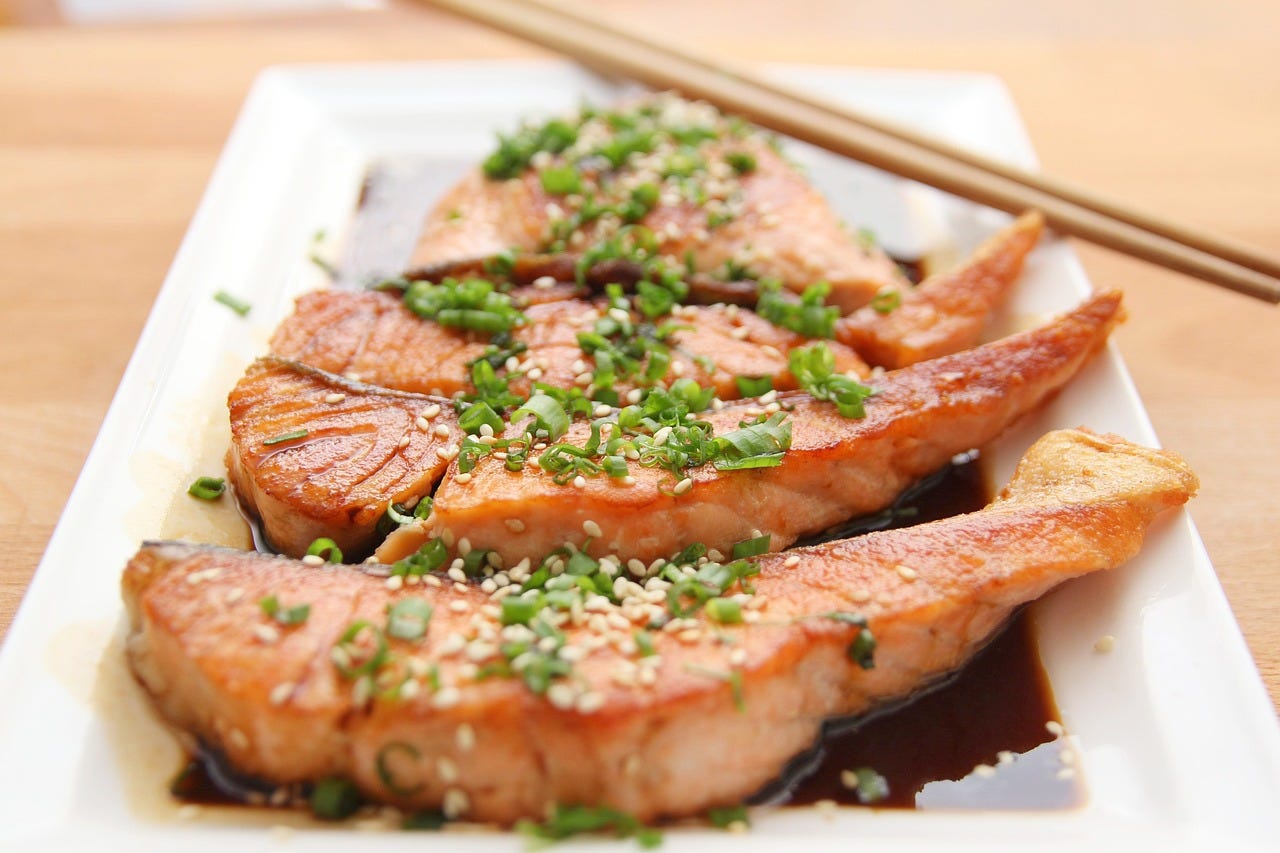The Best Foods to Eat for Higher Testosterone
There is no T-boosting superfood. A healthy balanced diet is what you need to keep your testosterone levels up.
Diet has a major influence on testosterone (T). A healthy diet helps you maintain healthy testosterone levels, particularly as you age. An unhealthy diet, on the other hand, lowers T levels through various mechanisms such as insulin resistance, increased inflammation and health problems like diabetes type 2 and heart disease.
In this post, we look at the best nutrients for boosting and maintaining healthy testosterone levels. These nutrients are essential in testosterone production and function.
Note: If you are experiencing symptoms associated with low testosterone (low libido, erectile dysfunction, depression, weight gain etc.) see a doctor for a proper diagnosis and treatment.
7 Nutrients That Boost Testosterone Levels
Important Note: These foods will not turn you into a high-testosterone beast of a man. If you already have normal/healthy T levels, they will help you maintain those levels. If you have low testosterone, they can improve your T levels. It’s the same way eating carrots won’t make your eyesight any sharper if you already have 20/20 vision (despite what you were told as a kid).
1. Monounsaturated Fats
Low fat diets are associated with lower testosterone in men. It seems fats are crucial in maintaining healthy T levels. But not all fats are equal. Some can cause more harm than good.
There are four types of dietary fats: monounsaturated, polyunsaturated, saturated and trans fats. The first two - monounsaturated and polyunsaturated - are the good kinds of fat.
The other two - saturated and trans fats - are unhealthy. Consuming too much of them raises the level of bad cholesterol (LDL), which increases the risk of cardiovascular diseases. Cholesterol clogs your arteries, restricting blood flow. This can cause sexual dysfunction problems such as erectile dysfunction.
You want more of the mono and polyunsaturated fats. They lower bad cholesterol, they boost testosterone and they are good for your overall health.
Monounsaturated fats are found in:
Avocados
Peanut butter
Some nuts and seeds like cashews, pumpkin seeds and sesame seeds.
Some vegetable oils including sesame, peanut, canola and olive oil.
Eggs.
Polyunsaturated fats are found in:
Fatty fish like salmon, sardines and oysters.
Certain nuts and seeds like chia seeds and flax seeds.
Some vegetable oils like soybean, sunflower and corn oil
But even with the healthy fats, you want to be careful. Do not overconsume them. This is particularly important with polyunsaturated fats. Some research shows that overconsumption of polyunsaturated fats can lower T levels.
When it comes to polyunsaturated fats, Omega 3 fatty acids are the most beneficial to Testosterone. So you need a healthy balance of Omega-6 and Omega-3 fatty acids.
The problem is that most men consume too much of the Omega-6s and too little of the Omega-3s. Too much Omega-6 fatty acids can raise inflammation and lead to lower T levels. They also compete against Omega-3 fats, leading to lower absorption of the beneficial Omega-3 fatty acids.
The recommended balance is 4:1 Omega-6 to Omega-3 (typical consumption can be as high as 17:1).
Get Omega-6 fats from foods like sunflower seeds, cashew nuts, pumpkin seeds and vegetable oils. Omega-3s are found in fatty fish (salmon, sardines, oysters etc.) as well as certain nuts and seeds like chia seeds and flax seeds.
2. Zinc
Zinc plays several important roles in the production of testosterone. It is involved in the conversion of testosterone to dihydrotestosterone, its active form.
Zinc also regulates the synthesis of certain proteins that are important for the production of testosterone. Zinc is also involved in the function of testosterone receptors.
Multiple studies have found that zinc deficiency causes a drop in the level of circulating testosterone. 30mg of zinc supplementation per day was found to raise T levels.
But you can get sufficient zinc through diet. Here are some foods that have plenty of zinc.
Nuts
Whole grains
Red meat
Poultry
Red meat like beef and pork
Dairy
3. Vitamin D
We mostly know vitamin D for its crucial role in keeping bones strong. It also does plenty of other important things in the body, including regulating testosterone production and function.
While researchers are not sure exactly what it does, the presence of vitamin D receptors and metabolizing enzymes in the male reproductive system (including in Testosterone-producing Leydig cells), suggests that vitamin D is important for maintaining healthy T levels.
Vitamin D deficiency is one of the most common nutritional deficiencies in both developing and developed countries.
In addition to feeling tired, frequent sickness, and bone pain, low testosterone is one of the symptoms of vitamin D deficiency.
Vitamin D supplementation and getting more sunlight can boost levels of vitamin D, and thus testosterone. It’s also important to add foods rich in vitamin D to your diet. These include:
Fatty fish
Dairy products like yogurt
Mushrooms
Egg yolks
Red meat
4. Iron
Iron is one of the most interesting micronutrients when it comes to testosterone. Too little of it is bad for T levels, and too much of it is disastrous for male fertility. Because it can easily generate free radicals, which damage tissue, the body works hard to keep it tightly regulated.
Iron is crucial for life. It allows red blood cells to transport oxygen, it is involved in energy production, and it’s important for the function of many enzymes and hormones.
A deficiency in iron causes a multitude of symptoms including fatigue, dizziness, shortness of breath and heart palpitations. In men, it causes a drop in T levels, since testosterone-producing cells don't get enough oxygen and energy to do their work. Low iron can also cause fertility issues, since it also affects sperm production.
Fortunately, it’s easy to get your iron up via diet. Leafy green, legumes, iron-fortified foods, fish, poultry and red meat are all rich sources of iron.
That said, sometimes iron deficiency can be caused by an underlying health problem, so it’s a good idea to talk to a doctor.
Other health problems and genetics can also cause an iron overload, which leads to sexual dysfunction and poor male fertility as free radicals damage tissue.
But you don't have to worry about iron overload unless you have hemochromatosis, a hereditary condition that makes it hard for the body to control iron levels.
5. Magnesium
Magnesium is important for energy production, which is necessary for making testosterone. Magnesium is also a cofactor (a molecule that’s necessary for enzyme reactions) in over 300 biochemical reactions, some of which are involved in the production of testosterone.
So a deficiency in dietary magnesium often results in lower testosterone levels, among other symptoms such as muscle twitching, cramps, osteoporosis and fatigue.
Taking magnesium supplements has been shown to increase T levels, with the highest rises seen in men who are physically active.
Eating foods rich in magnesium can also help raise T levels and keep them at a healthy level. The best sources of dietary magnesium include leafy vegetables, nuts, whole grains, bananas, dark chocolate and legumes.
6. Proteins
You need a good balance of all three macronutrients — fats, proteins and carbohydrates — to maintain healthy levels of testosterone. We’ve already talked about fats. Now let’s look at proteins.
A lot of hormones in the body, including testosterone, are derived from amino acids. The body gets these amino acids from proteins. So having adequate protein in your diet is absolutely essential in keeping your T levels up.
It’s easier for your body to get amino acids from animal proteins, so it’s a good idea to include fish, lean meat and other healthy meats in your diet in addition to plant proteins like legumes, nuts and tofu.
Too much protein is also bad for your testosterone, so don’t go overboard. One meta analysis found that eating more than 3.4g of protein per kg of body weight each day causes a significant drop in testosterone.
But such a high intake of protein only happens in specific diets like paleo and carnivore. Most people don't have to worry about eating too much protein. As long as you take between 0.8g and around 2g (for athletes and bodybuilders) of protein per kg of body weight daily, you are fine.
7. Carbohydrates
The research on the link between carbohydrate intake and testosterone levels is fuzzy. Some studies suggest that proteins and fats have the greatest impact on T levels. Others find that a low carb diet raises cortisol, which in turn negatively affects T levels.
As with other macronutrients, the right approach is moderation. You need carbs for energy, which is important for lots of processes in the body including the production of testosterone.
But too much carbohydrates can affect your blood sugar, cause weight gain and have other health effects that wreck your sexual health.
The type of carbs is even more important. Refined carbohydrates high in sugar, saturated and trans fats, and calories are terrible for your testosterone and overall health.
Bottom Line
Boosting your testosterone or keeping it at the right level is not about eating a few specific superfoods. You need a rich, diverse and balanced diet that delivers all the nutrients we have mentioned above, plus others we have not mentioned like fiber, antioxidants, boron and vitamin B12.
Here are the most important tips to integrate into your diet.
Add fatty fish to your diet - they are a great source of healthy fats. Vitamin D, proteins and other nutrients you need for testosterone.
Animal meats are also great for testosterone. They are packed with iron, amino acids, zinc and other nutrients.
Also eat plenty of nuts, legumes and leafy greens to add a wide range of minerals and vitamins to your diet.
When it comes to carbs, stick to healthy whole grain options.
If you are doing a diet like Keto, Paleo, vegan or Carnivore, monitor your T levels closely to see how they are affected. If you discover your T levels are down, adjust your diet or talk to a doctor or nutritionist for advice.
Love our work? Support the author at buymeacoffee.com/IsaacMathu






